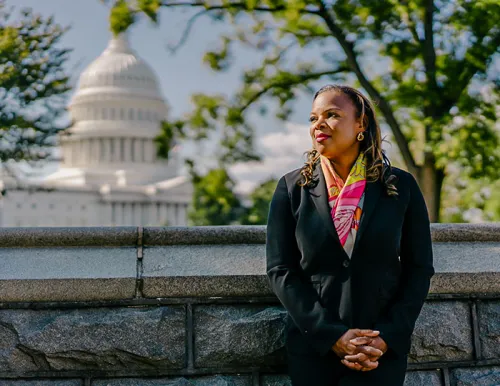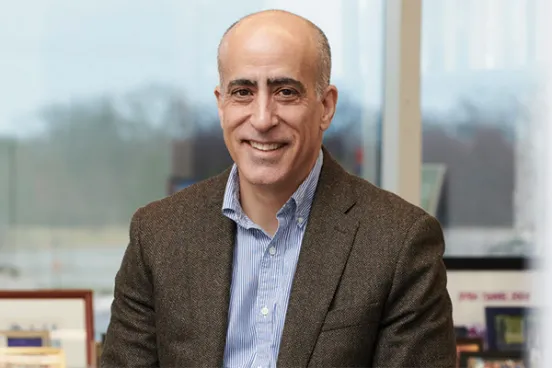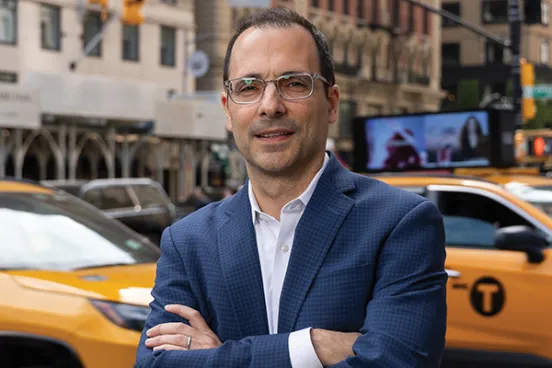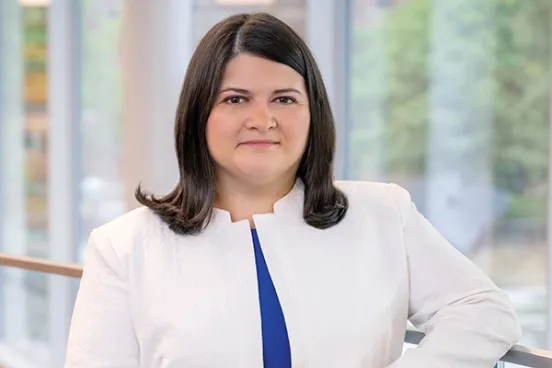
In 2018, when cryptocurrencies were only beginning to emerge as mainstream investment vehicles, economists and legal academics had begun examining the opportunities and risks that they posed for investors and markets. Among them was Kristin Johnson, ’03.
At a conference in London in 2019, Johnson presented an academic essay introducing questions about financial markets’ regulatory framework in the context of crypto markets. She later published an essay on her concerns about crypto trading in the University of Chicago Law Review.
Johnson has always had a strong commitment to public service and an abiding passion for addressing the big issues. So when the White House asked if she would be willing to lead a critical federal agency overseeing financial markets with a focus on crypto-regulation, she responded affirmatively and enthusiastically.
Now, as one of five members of the Commodity Futures Trading Commission (CFTC), a sister agency to the Securities and Exchange Commission, Johnson and her colleagues are charged with regulating US derivatives markets. As such, they oversee the creation and enforcement of rules to prevent fraud and manipulation in the markets they supervise—including crypto.
Driven to serve the public
An internationally recognized expert in the regulation of financial markets, Johnson’s background spans private practice and academia as well as public service. Following extensive finance-related work in law firms, she most recently held endowed professorships at Emory University School of Law and Tulane University School of Law. After being appointed to the CFTC by President Biden and confirmed by the Senate, she was sworn in for a five-year term on March 30, 2022.
The concept of public service deeply motivates Johnson. “It’s a tremendous privilege to have an opportunity to serve. I thought that when I served as a law clerk, and I continue to think that in this role,” she says.
While the five commissioners oversee the creation of new rules and enforcement of existing rules for commodities derivatives and futures markets, advocating for policies that help consumers is another critical part of the job that Johnson has particularly embraced.
“This is my opportunity to lend every talent or skill that I've developed over the course of my career to supporting and protecting as many American investors in markets as possible, and supporting and protecting the integrity of American markets,”
— Kristin Johnson ’03
For example, Johnson sponsors an advisory committee on market risk that recently published a report on climate risk in financial markets. She has also co-authored a forthcoming book that explores the implications of artificial intelligence in a just society. But perhaps the policy area she has focused on most closely—in writing and public speaking—is the issues raised by emerging technologies, including cryptocurrency and other digital assets.
The promise and peril of new technologies
Johnson is quick to point out the potential benefits of technologies like generative AI and distributed digital ledger technology (blockchain technology), which offer the promise of better, faster, cheaper, more inclusive financial services. But she also stresses caution. “Responsible innovation has transformative potential. However, we must ensure that decentralized finance and other technologies deliver promised benefits,” Johnson says. “We must also mitigate the possibility that these technologies may amplify risks such as cyber threats and predatory fraud targeting vulnerable investors.”
Cryptocurrencies are involved in a disproportionate number of fraud cases for several reasons. One is that cryptocurrency investors often use social media to flaunt a luxurious lifestyle they say is evidence that the crypto asset they are promoting is a lucrative investment. Another reason is that crypto markets can be highly volatile.
“When we couple the complexity of determining the value of crypto assets with the difficulty of navigating rapidly fluctuating prices, executing trading strategies might be difficult, even for professionals,” Johnson says. “This creates the perfect storm for fraudsters seeking to take advantage of the least sophisticated investors.”
Another important issue is a lack of transparency on investment platforms, many of which are organized outside the US and intentionally obscure details regarding their corporate ownership structure, including the location of their headquarters.
“While it may be quite easy for an investor to transfer money to an unlicensed platform, there is no guarantee that the investor will be able to withdraw her deposited funds. If the individuals controlling the trading platform misappropriate investors’ funds, it can be quite difficult for regulators to identify the platform owners, hold them accountable, or recover the investor’s money,” she says. “Many investors do not realize that there is likely no federal deposit insurance protection for the funds deposited with unlicensed trading platforms.”
Further complicating the matter, she notes, is that the regulatory opaqueness is happening in an environment where fraudulent activity multiplies quickly and easily.
“Fraudsters recognize that they do not even need to access Bitcoin or any other digital currency; they can simply market themselves as offering access to crypto-investments, collect investors’ deposits, and distribute false information regarding investment returns.”
Protecting the most vulnerable
One point Johnson emphasizes in her public outreach is the particular danger to vulnerable investor communities, which often become targets of scams and fraud artists. She explains that bad actors increasingly are using affinity groups—for example, members of a particular immigrant community—as a way to build trust among fraud targets.
“These vulnerable investor communities are often disproportionately targeted with marketing materials and solicitations that invite them to participate in financial investment opportunities. This includes individuals who are retired and who might have limited resources or a fixed income,” Johnson says. “There are also campaigns designed to attract marginalized investors who have felt left out of traditional financial markets. This type of predatory activity is deeply concerning.”
This sort of fraud often uses a particular group’s heritage, including their primary language or their religious affiliation, as a tool to gain their trust, Johnson explains. Then, when the victims realize what has happened, they may be reluctant to seek help.
Work to do
So what’s to be done about these issues? “There’s a tremendous amount of work for us to do on a number of fronts,” Johnson says. “One of them is investor education. In addition, we’ll always be focused on enforcement as well.”
Johnson also looks to Congress to address long-term solutions for regulatory oversight of the markets and their products. And more broadly, she also sees the need for the US to participate in international conversations about such regulation.
“I think we have a long way to go in understanding and building out the guidelines that would govern transactions in these markets,” she says. “It’s not simple, but there’s a coalition of the willing and great colleagues in a number of jurisdictions around the world who are really thoughtful and engaged in a conversation about how best to regulate these markets. I hope that I am helping to lead these conversations and to build a solid foundation for investor protection and market integrity across all markets.”







